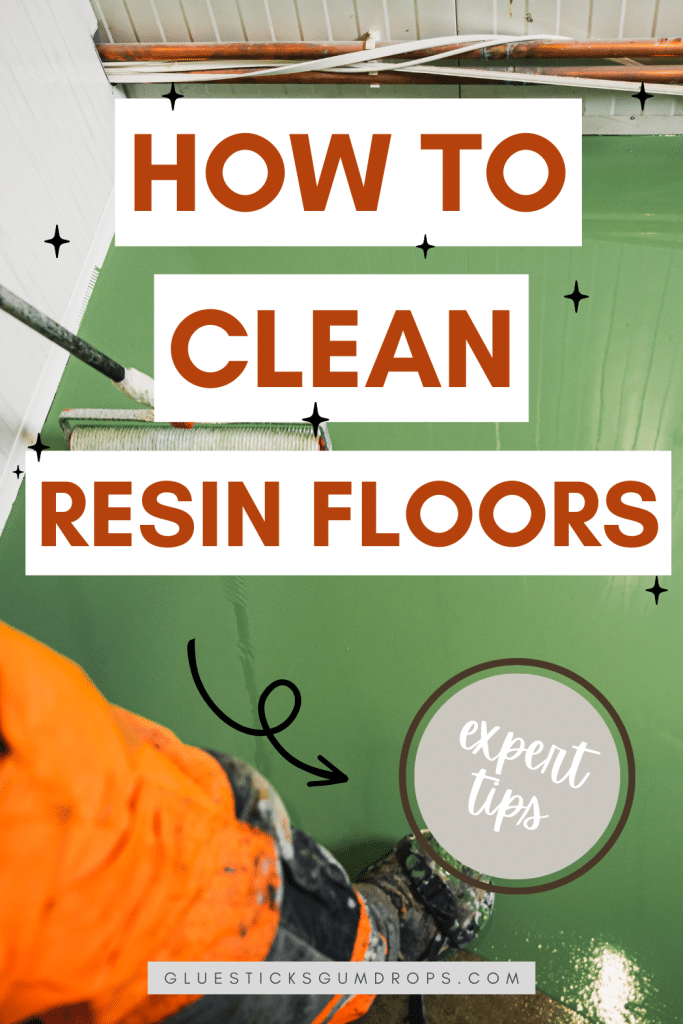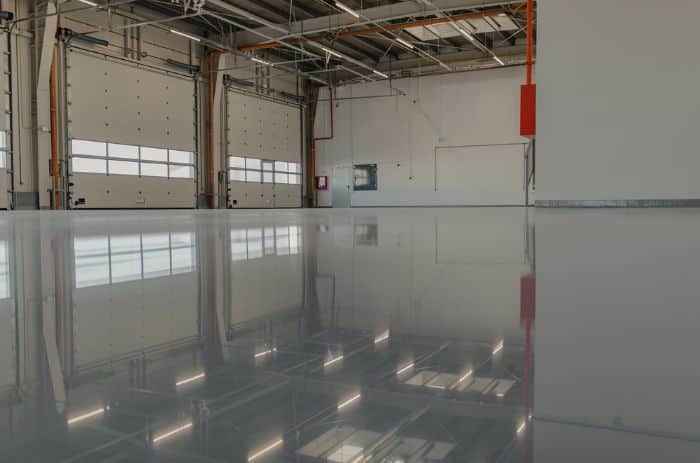Resin flooring has a wide range of benefits. Not only is it aesthetically pleasing but it is also extremely durable and long-lasting. To get the most out of your resin floor, however, it is important to keep it clean. A dirty epoxy floor will lose its attractiveness but, perhaps more importantly, it can also lead to damage which will reduce both the durability and the lifespan of the surface.

It is important to remember that a resin floor surface is not the same as a standard concrete surface so different resin floor cleaning methods will need to be applied. With tips from Trusty Tread on how to clean a resin floor we have gathered some valuable expert tips to help you keep yours in tip-top shape.
Creating a cleaning regime
To properly maintain resin flooring, a clear floor cleaning regime is always advisable. This is especially important in industries that deal with food, work with harsh chemicals, or where heavy machinery or vehicles will routinely be used on the floor surface, such as in your garage.
Dust removal
For starters, you should remove dust, dirt, and loose debris frequently. In a food production environment, a build-up of dirt is a hygiene issue. But even in a garage or manufacturing environment, dirt should be removed regularly.
Dirt can be an abrasive material, particularly if it contains grit particles. When a heavy vehicle, piece of equipment, or even foot traffic pushes and pulls this dirt around it can cause small scratches in the resin surface. These scratches can build up over time.
The dust removal stage should always happen before any wet cleaning begins.
Vacuum cleaning
Vacuum cleaning with a soft brush attachment is the easiest and quickest way of removing dust and dirt from a resin floor.
For smaller epoxy floors, you could also achieve this using a broom or dustpan and brush.
Mopping
Generally speaking, using a mop and bucket isn’t recommended for cleaning resin flooring. With a mop and bucket, you will often end up just smearing dirty water over the flooring surface without actually removing the dirt.
A hard foam mop is a better option for epoxy floors. The sponge is highly absorbable and the dirty water can be wrung out regularly.
Scrubbing
For heavily soiled epoxy floors and for a deeper clean than vacuuming and mopping can achieve, the best method for epoxy flooring is scrubbing. This can be done manually or mechanically.
Manual scrubbing
The key to manual scrubbing is the continuous addition of clean water and the removal of dirty water. You don’t always have to use a cleaning agent like soft scrub to clean resin flooring. Often, just water will be enough. Some soap-based floor cleaners are not suitable for epoxy floors so it is worthwhile to use a product that is specifically designed for this type of surface (these will often be low- or no-alkaline).
Depending on the environment in which the resin floor sits, you may need to use specific cleaning products based on the type of waste and dirt that will be produced.
First, the surface dirt and dust need to be removed. Then, if you are using a cleaning product, this should be applied and worked into the floor using a soft deck brush.
Next, the entire area should be flooded with clean water and the deck scrubbing brush should be used to scrub the surface.
The dirty water should then be promptly removed. You can do this manually by using a squeegee or mechanically using a wet vacuum.
Mechanical scrubbing
Mechanical scrubbing is a more efficient and thorough method of cleaning resin floor surfaces. There are a variety of different floor scrubbing machines available. For example, some machines will use squeegees to remove the dirty water into a tank whereas others will use a wet vacuum. Some machines are pushed along whereas others can be ridden. The type of machine you need will depend on several factors including the size of the resin floor and the amount and type of dirt expected.
Generally speaking, a mechanical scrubber will do the following:
- dispense any cleaning product
- use rotary brushes to scrub the floor
- remove dirty water
Once you have gone over the resin floor with your mechanical scrubber, you should flood it with clean water and then go back over with the machine one more time.
Diamond-impregnated pads
Using diamond-impregnated pads to clean and polish epoxy resin floors is the preferred method for many people. These pads contain microscopic diamonds that can clean the surface without needing to use soap-based cleaners or chemicals at all.
The benefits include:
- chemical-free cleaning
- hygienic clean
- no soap residue
- reusable pads
- sheen restoration
- small scratch removal

Pressure washing
The team at Rightwash says you can pressure or jet wash a resin floor much like with resin driveways and it is an effective cleaning method for removing stains, dirt, and grime. Care should be taken, however, because the high pressure of these machines can easily damage the epoxy surface. This is especially the case if the machine is set to a high psi or if the jet is concentrated in one area for too long.
Because of the risk of damage, it is often a good idea to seek advice from a professional or use a cleaning company to pressure wash an epoxy floor.
Spot cleaning
Alongside your regular cleaning schedule, spot cleaning should be conducted promptly as and when it is needed. As soon as any spill occurs, steps should be taken to clean it up as quickly as possible. While resin floors are hardy and resistant to water, chemicals, grease, and stains, reducing the frequency with which the floor needs to deal with these issues will increase its lifespan.
These types of spills can also present a safety hazard. If the spill is chemical in nature then it will provide a direct risk to anyone in the vicinity but even a water spill or engine oil leak can be dangerous because it can create a slip hazard. Even if your resin floor has been treated with an anti-slip coating, water and oil will still be slippery if it is sitting on the surface.
To spot clean, use an absorbent microfiber mop or cloth to soak up the spill as soon as possible. Then, clean the area using your preferred scrubbing technique.
The bottom line
An epoxy resin floor is relatively easy to maintain compared to other flooring types. Regular dust and loose dirt removal coupled with scrubbing can often be enough to keep the surface clean and properly maintained. This will make sure that the floor retains its durability and will increase its lifespan.
